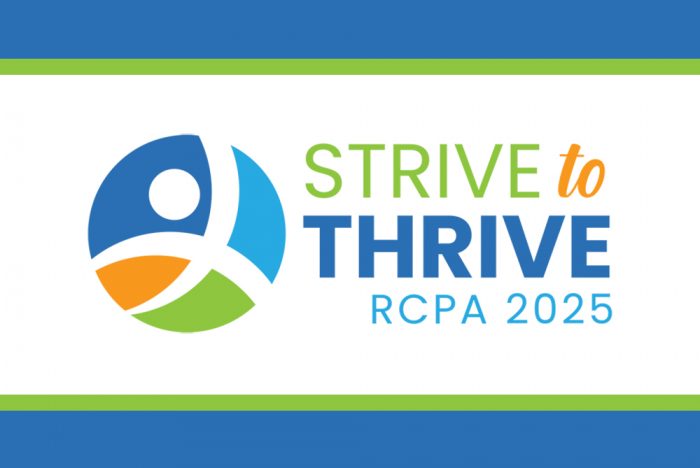Mobile App Access — The Key to the Complete RCPA Conference Strive to Thrive Experience!
With the summer days flying by, time is running out to register for the 2025 RCPA Conference Strive to Thrive! Online registration closes August 29, and by registering early, attendees will gain access to the mobile app, sponsored by Millin, a full week ahead of schedule! This means you’ll be able to:
 View the complete agenda and create your individualized schedule of workshops to visit;
View the complete agenda and create your individualized schedule of workshops to visit;- See the layout of Connections Hall and plan ahead for visiting exhibitors as well as participating in the Connections Hall game;
- Connect directly with other attendees and exhibitors in order to coordinate meetings, schedules, and more;
- Use the “Shake” feature onsite — by “shaking” your phone at a fellow attendee, you will seamlessly share contact information, making networking as easy as waving hello; and
- Gain access to the summer RCPA webinar recordings.
Register today to reserve your seat to the conference and access the app as soon as it launches! All attendees who have registered will receive an email one week prior to conference with complete instructions on downloading, accessing, and utilizing the mobile app.
View the Registration Brochure for complete details regarding our schedule, booking a hotel room, and more!
RCPA Announces New Panel Discussion on PA State Budget at the 2025 Conference Strive to Thrive!
The status of the PA state budget continues to impact every provider, insurer, and health care organization. With funding in limbo and federal Medicaid cuts already causing disruptions in services, providers are having to work together and create unique solutions to funding and providing patients with quality care.
At the 2025 RCPA Conference Strive to Thrive, RCPA is hosting an Agency Leadership Discussion Panel comprised of experts who have been following the status of Pennsylvania’s budget. The panel will include professional input from:
 |
 |
 |
|
Paul Dlugolecki
Brier Dlugolecki Strategies |
Jack Phillips
Novak Strategies
|
Jenn Tyler
Wojdak Government Relations
|
Join this panel on Wednesday, September 10, in the Crystal A room, from 3:15 pm – 4:15 pm, where they will:
- Discuss the current status of the budget and potential timelines;
- Analyze the impacts of the budget impasse and the budget itself on providers and health care organizations;
- Share strategies that providers are using to continue providing care to their patients; and
- Host a Q&A with attendees for an open, honest discussion on what is happening and what providers can do to support themselves and others.
Registration Ends In Just Two Weeks for the RCPA Conference Strive to Thrive!
The 2025 RCPA Conference Strive to Thrive is packed with more than just engaging workshops led by informative speakers. RCPA will host a wide variety of events throughout the week at the Hershey Lodge, granting attendees access to networking events, receptions, and more! By registering today, not only will you reserve your spot to interact with local and national leaders in health and human services, but you will gain access to:
- Our Welcome Reception, which offers a great chance to network with RCPA staff and your colleagues.
- Gentle Yoga and Breathwork, which will be hosted Wednesday morning for those who enjoy an early morning workout routine.
- Our Association Awards Luncheon, where we recognize those who stand above the rest and lead those in the industry.
- Carelon Connections Hall’s Opening Reception and Connections Hall Luncheon, which will include food, the chance to see and learn about the latest products and services in health care, and our event game, with a possibility to win a multitude of prizes.
- An Agency Leadership Discussion Panel on Wednesday in the Crystal A room with Jack Phillips, Novak Strategies; Paul Dlugolecki, Brier Dlugolecki Strategies; and Jenn Tyler, Wojdak Government Relations. Come discuss, ask questions, and get the latest information on PA state budget developments, including the impact of the budget on providers and strategies providers are utilizing.
- The RCPA PAC Silent Auction, for those interested in donating to a good cause!
Opportunities for sponsorships and advertising are still available to organizations that are interested, but EXHIBIT BOOTHS ARE OFFICIALLY SOLD OUT! We are grateful to all our sponsors, exhibitors, and advertisers who help make the conference happen. Contact Carol Ferenz, Conference Coordinator, for more details.
View our sponsors and exhibitors at our Conference website!
DHS Seeks Feedback on Commonwealth’s Rural Health Transformation Plan

Thank you for your participation in Pennsylvania’s rural health ecosystem, including those who attended a regional rural health summit. As a next step, DHS is gathering information, concepts, and additional ideas to shape the Commonwealth’s Rural Health Transformation Plan and reflect what they heard from rural providers, partners, and residents.
What DHS is asking for:
- Information and concepts in these summit-affirmed areas: Maternal Health, Mental and Behavioral Health, Aging and Access, Transportation and EMS, and the Rural Healthcare Workforce.
- Other ideas that improve access to care in rural communities, even if they fall outside those five areas.
Who can submit:
- Hospitals and health systems;
- Healthcare professionals;
- FQHCs and rural health clinics;
- State offices of rural health;
- Grantees providing services in rural areas;
- Healthcare leadership and administrators;
- Healthcare consumers;
- Community action organizations;
- Public and private business owners and organizations;
- EMS and transportation providers;
- Behavioral health, aging, and disability services partners, county commissioners, and other local or state government representatives, single county authorities, economic development organizations, professional organizations, community-based and faith-based organizations, philanthropy, and higher education and health provider training partners; and
- Other interested parties.
What to include:
Information to assist DHS in enhancing and transforming rural health, including core concepts, target problems, or opportunities for improvement, intended impact and success metrics, evidence or prior experiences, feasibility of ideas for rural settings, partners, costs and resources, innovation or adaptation, and sustainability.
Submit by: August 29, 2025
Find the Form Here
Questions or Accessibility Needs: Email
DHS may use the information gathered through this process in the development of future implementation; however, the Departments do not guarantee that this will occur.
Respondents should be aware that the responses will be public information and that no claims of confidentiality will be honored. DHS is not requesting, and does not require, confidential, proprietary information, or other competitively sensitive information to be included as part of a submission. Ownership of all data, material and documentation originated, prepared, and provided to the Departments during this process will belong exclusively to the Departments.
Please contact your RCPA Policy Director with any questions.
ADvancing States Shares Findings From National Survey of Adult Protective Services
RCPA Announces New Keynote Speaker for the 2025 Conference Strive to Thrive!
 With a little less than a month before kick-off, RCPA is excited to announce a new keynote speaker in our lineup at the 2025 Annual Conference Strive to Thrive! We will now be kicking off our conference with Al Guida, JD, Owner of Guide Consulting Services, Inc., to discuss Impacts of Federal Issues on the Human Services System. Guida is a nationally recognized advocate and strategist who has provided valuable federal policy and regulatory solutions for Guide Consulting Service’s health care clients in the provider, technology, and public health sectors. He has helped clients realize measurable goals in mental health parity, biomedical research, child poverty, and child welfare, and his legislative portfolio includes successful collaborations with major Congressional committees, the Department of Veterans Affairs, and the Department of Health and Human Services. Working together, the Guide Consulting Services team have established and secured funding for Mental Health First Aid, Certified Community Behavioral Health Clinics, and the 988 National Suicide Prevention Coordinating Office. In 2024, Guida was recognized as one of DC’s 500 Most Influential People.
With a little less than a month before kick-off, RCPA is excited to announce a new keynote speaker in our lineup at the 2025 Annual Conference Strive to Thrive! We will now be kicking off our conference with Al Guida, JD, Owner of Guide Consulting Services, Inc., to discuss Impacts of Federal Issues on the Human Services System. Guida is a nationally recognized advocate and strategist who has provided valuable federal policy and regulatory solutions for Guide Consulting Service’s health care clients in the provider, technology, and public health sectors. He has helped clients realize measurable goals in mental health parity, biomedical research, child poverty, and child welfare, and his legislative portfolio includes successful collaborations with major Congressional committees, the Department of Veterans Affairs, and the Department of Health and Human Services. Working together, the Guide Consulting Services team have established and secured funding for Mental Health First Aid, Certified Community Behavioral Health Clinics, and the 988 National Suicide Prevention Coordinating Office. In 2024, Guida was recognized as one of DC’s 500 Most Influential People.
With the current confusion and chaos surrounding federal policies, Medicaid, future funding, and their effects on the health and human services landscape, you won’t want to miss this informative opener!
 Following Al Guida will be Pennsylvania’s DHS Secretary Val Arkoosh. Attendees will shift their focus from the federal level to the state, with the DHS Secretary highlighting key issues facing PA providers, including trends, impacts of federal policy at the local level, and current initiatives related to Performance-Based Contracting and value-based purchasing.
Following Al Guida will be Pennsylvania’s DHS Secretary Val Arkoosh. Attendees will shift their focus from the federal level to the state, with the DHS Secretary highlighting key issues facing PA providers, including trends, impacts of federal policy at the local level, and current initiatives related to Performance-Based Contracting and value-based purchasing.
All this and more on the very first day of the Conference! Register today to reserve your seat, and view the Registration Brochure for complete details regarding our schedule, booking a hotel room, and more!
RCPA Member Inglis SDHP 2025 Annual Conference “Opening Doors Together” on August 26 – 27; Panel to Include RCPA PD&A Division Director Fady Sahhar
New Financial Management Services Monthly Rate Effective September 1, 2025
Effective September 1, 2025, there is a rate change in the OBRA Waiver and Act 150 Program for the monthly Financial Management Services (FMS) procedure code W7341. The new FMS monthly ongoing rate is $101.43, starting with the September 1, 2025, date of service.
Home and Community Services Information System (HCSIS) service plans are being updated to reflect the September 1 effective date. Service Coordinators do not need to make any service plan updates for this rate change, as an HCSIS system-wide update is being deployed to make the necessary service data rate updates on the impacted service plans.
If you have any questions, please contact the Office of Long-Term Living Provider Inquiry Line at 800-932-0939, Option 2, Monday through Friday from 9:00 am – 12:00 pm or 1:00 pm – 4:00 pm.
ADvancing States Publishes “Enabling Technology in Long-Term Services and Supports and Medicare”














